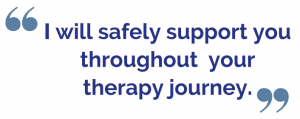Welcome - you've made an important decision to begin counselling and there may be a lot going on for you right now. It's normal to feel nervous, emotional, or even relieved, and it's also absolutely okay to be feeling a sense of vulnerability. We're about to enter into a unique, equal and honest therapeutic relationship unlike any you will have experienced with anyone else in your life. You may talk about things that you've never shared before, or possibly even said out loud...and I will be with you every step of the way.
My aim is to give you an idea of what to expect both now and in subsequent sessions, in a way that'll hopefully make you feel more comfortable, especially if this is your first time experiencing psychotherapy. You've made that first step, and I totally understand how it feels to be where you are - the feeling of anxiety, or perhaps the prospect of being 'fixed'. You might also be wondering if you'll be kept safe, if I will take the time to actually listen, or if I will judge you - the answers to which are "Yes", "Yes" and most definitely "No!"
You've arrived on time for the start of your first session, but just before we begin, let's take a minute to talk about what I meant by 'equal and honest' in the therapeutic relationship. These both go hand in hand with confidentiality and form the basis for openness, respect, and my acknowledgement of your right to autonomy. We'll work at your pace, beginning with an assessment of the issues you're currently dealing with, your family history, and what you hope to gain, change, or achieve from counselling.
Assessment and Information gathering: This is an important part of the first session and the time when we'll complete what I like to call the 'housekeeping' elements of professional psychotherapy. This involves an assessment that outlines your personal history; including any mental health, medical, or relationship difficulties. I'll also ask about your current emotional state, behaviours, and past experiences. You will be asked about specific symptoms, such as anxiety, depression, or trauma, which will help to form an understanding of your reasons for coming to counselling. We will also talk about how progress is measured and developed over time, and how I will safely support you throughout your therapy journey. It's not as daunting as it might sound, and I'll be right there alongside you, happy to answer questions or clarify any concerns you may have.
 |  |
In this moment, I want to encourage you to be open, to actively participate, and to be ready to do the work, because we're in this space for you and your therapy needs. It's the one opportunity in the week where you get to talk through the issues that you're dealing with in life, and I won't jump in to try to 'fix' them (or you) or to tell you what to do. Building trust takes time, so it's totally okay if you don't feel an instant connection - sometimes it happens - but you'll know when it's right. That sense of safety that I mentioned earlier will help to grow your trust in me and enable you to decide when, and what, you're ready to share, and in the meantime, I'll respect both you and the healing process.
So, our first session is primarily about exploration, and you don't have to reveal everything at once. That said, I'm sure that you'll want to make the best use of your time, so sessions are all about your agenda, which in counselling terms is our shared understanding of the issues that you want to address. We'll talk about your short and long term goals for therapy, however, this might develop and change over subsequent sessions as you start to gain clarity, and possible themes or deeper stressors begin to reveal themselves.
A little bit of theory: I work creatively and with psychodynamic therapy, which is a therapeutic approach that focuses on the unconscious mind and how it influences a person's feelings, actions, and behaviours, essentially I'll be helping you to explore the unconscious motivation for the things that you say and do. We'll also explore the other elements of what makes up you, such as biology, psychology, and social pressures, and how they can affect your behaviour or the way you relate to others. This is a fundamental stage that helps to influence your growth into self-awareness.
What happens at the end of your session: During the final minutes of your 50-minuite session, I will ask how you're feeling, and this is a time for you to 'come back into the room', especially if some difficult memories or emotions come up for you. I will help you to feel safe to leave the space, and we may do some 'grounding' or calming exercises. We will discuss your next steps, which may include reflecting on what you shared, either in the moment or during the following week. We will also schedule future sessions, which should be consistent - same day, same time each week - in order for you to gain the most from your time in counselling.
Tips for what to do after your sessions:
* Breathe - take a moment to be alone and quiet
* Go for a walk - get some air and use the time to process
* Take in the sights, sounds, and smells around you
* Grab a coffee or your favourite herbal tea
* Journal your thoughts or record them in a safe place
* Reflect on what came up for you and its affects
* Consider what you might want to talk about in your next session
